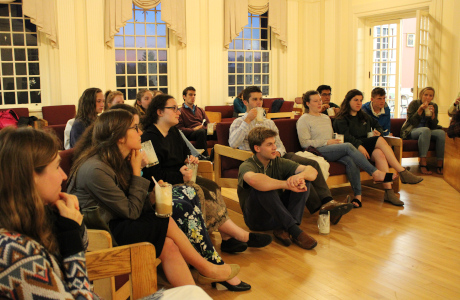- Home
-
About
 Fidelity & Excellence
Fidelity & ExcellenceThomas Aquinas College is unique among American colleges and universities, offering a faithfully Catholic education comprised entirely of the Great Books and classroom discussions.
-
A Liberating Education
 Truth Matters
Truth MattersTruth, and nothing less, sets men free; and because truth is both natural and supernatural, the College’s curriculum aims at both natural and divine wisdom.
-
A Catholic Life
 Under the Light of Faith
Under the Light of FaithThe intellectual tradition and moral teachings of the Catholic Church infuse the whole life of Thomas Aquinas College, illuminating the curriculum and the community alike.
-
Admission & Aid
 Is TAC Right for You?
Is TAC Right for You?Do you enjoy grappling with complex questions? Are you willing to engage in discussions about difficult concepts, with the truth as your ultimate goal?
-
Students & Parents
 Mind, Body & Spirit
Mind, Body & SpiritThere is always something to do at TAC — something worthwhile, something fulfilling, and something geared toward ever-greater spiritual and intellectual growth.
-
Alumni & Careers
 What Can You Do with a Liberal Education?
What Can You Do with a Liberal Education?Nothing speaks more to the versatility of the College’s academic program than the good that our alumni are doing throughout the Church and the world.
- Search
- Giving
Assistant Dean Gardner Goes “On Tap” for New England Students
One week after their California counterparts, the College’s New England students gathered last Thursday for an “On Tap” forum with their campus’ assistant dean for student affairs. Over the course of a two-hour conversation accompanied by root-beer floats in the Gould Hall lounge, Dr. Patrick Gardner answered questions on a wide range of topics, including future plans for campus buildings, the nature of the College’s classical curriculum — and his children’s names. Students also peppered him with queries about his days as an undergraduate at Harvard University and the best way to study for exams, which led to some thoughtful conversations about the purpose of liberal education and the reasons for the College’s Code of Conduct.
When he was in college, Dr. Gardner reflected, there was a widespread mentality of “work hard, play hard” by which, in the name of ‘blowing off steam,’ students could rationalize behavior at odds with the dignity of education. “That’s what a lot of this college’s rules of residence are aimed at, making sure that, in the everyday sense, leisure activities, relaxation, are pursued in such a way that it’s not going to end up making you a hypocrite; it’s not going to be in tension with the main things you do here,” he explained. “That would be an unstable situation, to be devoting yourself to the life of the mind in the classroom and then dulling your mind or being immoral outside the classroom. Our aim is to help you balance study and extracurricular activities in a way in which you don’t see them as ‘working hard’ and ‘playing hard,’ you see them both as part of the life of leisure, in both the highest sense and in a lower sense.”
The dress code, he observed, serves a similar purpose. “The central principle is that we are body and soul; we are embodied beings, and how we treat our body, including what we wear, affects, often in an unconscious way, what we are doing,” said Dr. Gardner. “How you comport yourself and how you attire yourself affects how you go about your business. And so having a dress code causes us to take more seriously the work we are doing here, which is eminently worth taking seriously. It treats our education like the high thing it is, the opportunity it is, and as an occasion to which we want to rise.”
As the first students on Thomas Aquinas College’s newly acquired New England campus, the assembled sophomores and freshmen naturally were curious about what sets their region and campus apart, and how those differences could influence their education. “The history is the biggest difference,” Dr. Gardner remarked. “Harvard, for example, was founded 140 years before the United States declared its independence. There is a level of history here that we don’t get almost anywhere else on this side of the Atlantic, even if not all of the history is pure. I, for one, love being in place that has deep roots.”
Then there is the climate. “The seasons mean a lot to me,” Dr. Gardner continued. “The seasons belong together with the academic year. In California, you have to decide: Now it is time to get to work. The beach is going to be there the whole year round, and I just have to decide it’s not beach time anymore. It requires an act of the will. Here, the cold naturally turns the focus to the things of the mind.”



